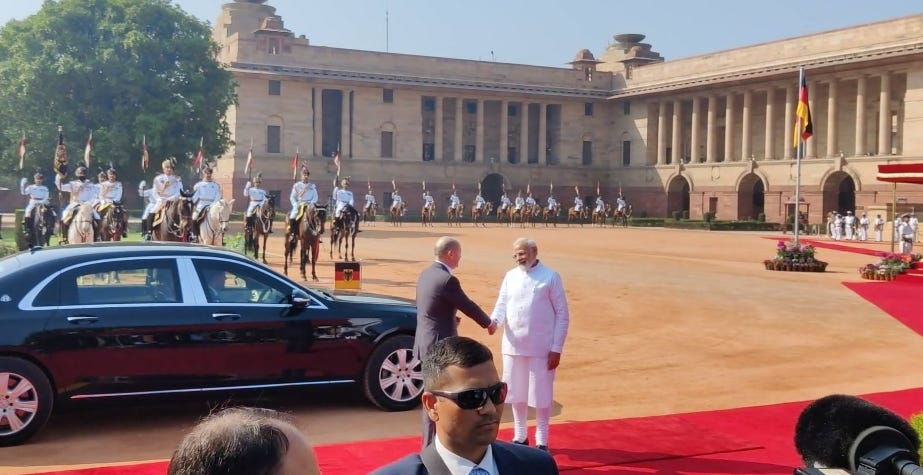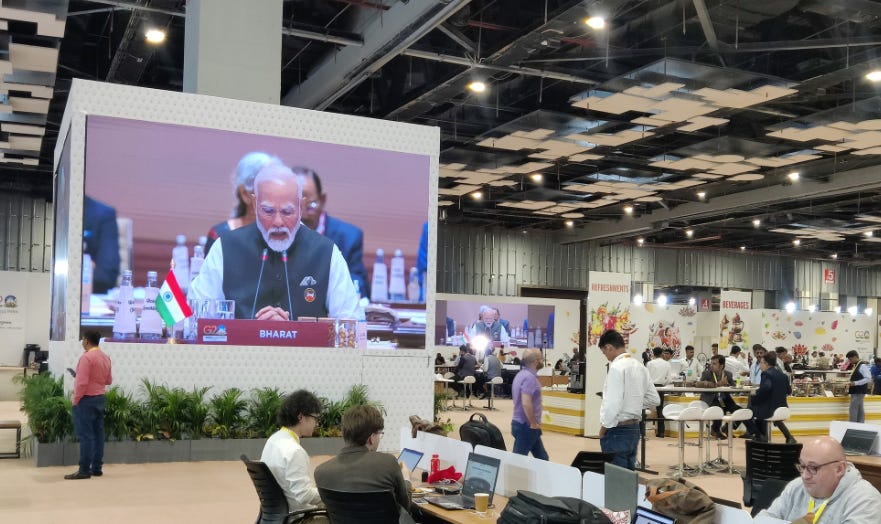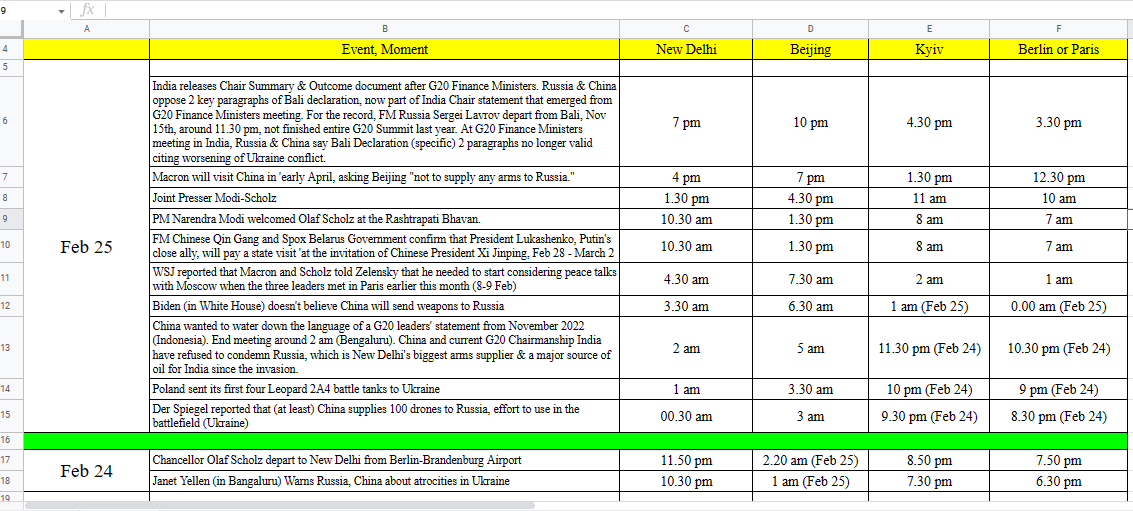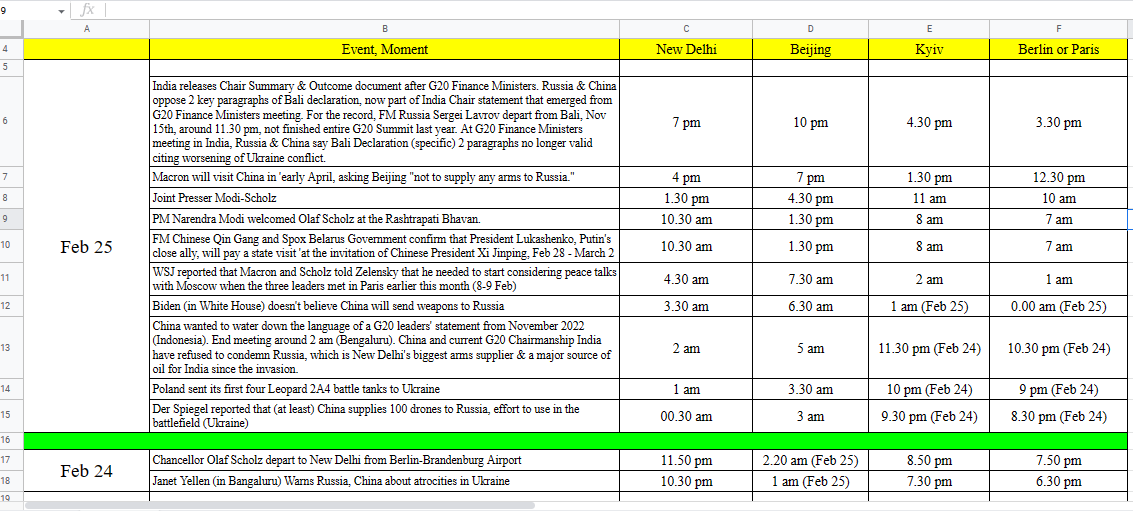Crucial in Minutes: How G20 2023 India Chairmanship Led the World to End Russia - Ukraine War (or Contrary, Bigger Disaster)
In Hyderabad House, New Delhi today, the German chancellor Olaf Scholz, alongside PM Narendra Modi, calls "Russian war on Ukraine" a "major catastrophe", 1 year and 1 day of Russia's invasion (to Ukraine). Olaf Scholz says "terrible war of aggression started by Russia against Ukraine" has led to immense losses which is a "major catastrophe". Olaf added, India EU FTA should not drag on.
PM Narendra Modi calls for UN reforms & mentions G4 grouping. The Ukraine conflict has had an impact on the prices of commodities, says PM Modi as he emphasizes dialogue & diplomacy. Adds, India will support any peace plans. According to WSJ (Wall Street Journal) 8 hours ago, Macron and Scholz told Zelensky that he needed to start considering peace talks with Moscow when the three leaders met in Paris earlier this month.
Germany is the biggest trading partner in Europe, says PM Modi as he mentions opportunities in India for German investors. German Chancellor Olaf Scholz arrived in India (5 hours ago) on a two-day visit. In India Scholz says "will discuss peace in the world." At least, Modi meet Scholz last November when Indonesia as Chairmanship G20.
India’s natural / traditional enemy, till today, is China & also Pakistan. 400k (accumulation) soldiers China and India at the borders. Both countries (and also Pakistan) have nuclear weapons. But all situation in 2022 and current 2023, sucked in just crucial issue: Russia-Ukraine.
9 Months ago, Indian Airforce bought a Rafale (France) jet fighter with the same quantity as Indonesia. Until today, India still has “QUAD” members, among the US, Australia, and Japan. Then, India decided to “ease” Russia's suffering amid war with Russia - Ukraine with the Rouble - Rupee scheme mechanism. India really acknowledges Russia is “staunchest ally” for China. China Wang Yi was told “solid rock”, again, when Wang Yi met Putin in same day when Biden meet Zelensky in Kyiv.
And just remember one (another thing) after EU Ursula von der Leyen visited India 5 months ago: another high ranking leader was “Indian root”, named VP of the U.S. Kamala Harris. And before Scholz, only 3 weeks after the G20 Summit in Bali Indonesia, FM Germany Annalena Baerbock visits India, again, to lure India, to make sure India gives a tougher position or stance to Russia.
And yesterday (Feb 24th), U.S. Secretary Treasury Janet Yellen also came to India (1st round meeting of Finance Ministers and Central Bank Governors of G20 members), in relevance to the India Chairmanship G20 this year.
Yellen said the U.S. would redouble its efforts to marshal global support to help Ukraine fend off Russia. As finance ministers from G20 nations gathered, Yellen said more must be done to inflict pain on Moscow. Yellen accused Russian officials attending a G20 finance leaders meeting of being 'complicit' in atrocities in Russia's invasion of Ukraine, while host India avoided mentioning the year-long war in inaugural remarks. Yellen warns China of "serious consequences" if it helps Russia evade US sanctions.
Only 2 hours after Yellen warns Russia and China about latest atrocities in Ukraine when Yellen in India, and around 30 minutes Scholz already depart from Berlin to New Delhi, Der Spiegel reported that Russian military is engaged in negotiations with Chinese drone manufacturer Xi'an Bingo Intelligent Aviation Technology over the mass production of kamikaze drones for Russia, at least, according to Der Spiegel, 100 drones.
Only 30 minutes after Der Spiegel report, Poland President Duda confirmed to send Leopard to Ukraine.
Biden in the south lawn of White House, only 3 hours after Der Spiegel report, does not believe China will send weapons to Russia - in comments that appear at odds with the level of concern expressed by some US officials. "I don’t anticipate a major initiative on the part of China providing weapons to Russia," Biden said.
Only 30 minutes after Biden’s comment, Zelensky says he plans to meet Chinese president, Xi Jinping. “China started talking about Ukraine and I think this is a good thing,” Zelensky said. “But it actually begs the question, what will these words be followed with? Zelenky said.
Since the Munich Security Conference 2 weeks ago, former Chinese FM Wang Yi reiterated the “peace proposal or peace plan” to end the war between Ukraine - Russia.
Coincidentally with 1 year of Ukraine-Russia war, India itself is witnessing how the India Chairmanship of G20 this year will be very heated, hour-by-hour, about prolonged Russia-Ukraine war.
Between Harris, von der Leyen, Baerbock, Yellen until Scholz, amid intra issues (US-India; EU-India, or Germany-India), all trying to make sure India joined in isolating Russia in the wake of the Ukraine - Russia war. The fact, India rocketing on foreign trade with Russia
The Russia-Ukraine war poses a fundamental challenge to India’s traditional strategy of non-alignment. India, currently mitigate, finds itself between a rock and a hard place, potentially antagonizing the West while still losing Russia to China's embrace.
India abstained in a succession of United Nations votes – in the Security Council, the General Assembly, and the Human Rights Council – condemning the Russian invasion. On March 2, the United Nations General Assembly voted, 141 to 5, on a resolution condemning Russia for invading Ukraine. India, the world’s largest democracy, abstained from the vote. Again, to commemorate the 1 year Russia invasion, India (alongside Bangladesh, Pakistan) also abstain (Feb 24th, 2023).
It wasn’t India’s first abstention. In its initial “explanation of vote,” India did not even mention Russia or deplore the invasion. Instead, India merely urged a de-escalation of the conflict by those involved, as if both countries were belligerents, when in fact there is an obvious aggressor and a clear victim. India did not even object to Russia’s earlier recognition of the independence of the separatist Ukrainian regions of Donetsk and Luhansk, and with atrocities like in Bucha, Bakhmut, and Mariupol.
Cooperation with any country could be conducted so long as it brings benefits to the people. This is very complicated amid the Russia - Ukraine war, and, in a lot of ways, Indonesia, not so brave like India, currently enjoys very cheap oil from Russia and doesn't worry about sanctions from the West.
About Russia, for first. Due to the war and Oil Price Cap from December 2022, the Russian government since the war started already giving a proposal across the world about “very cheap price” Russia energy and commodities. Russia’s Putin knows since before starting the war, that Russia will face boycott or sanction.
So far, India enjoyed significant, rocketing oil supply from Russia. “Minister from Russia”, Luhut cited, angry because he claimed that Pertamina already received a proposal from Russia (maybe under Gazprom) about very cheap oil but Pertamina never followed up. In my opinion, Pertamina is really worried that it will be facing a sanction by the Western alliance if Pertamina rubber-stamps Russia's supply.
The rebalancing of the global energy order continues with India flooded with Russian oil.
Russia became the third-largest oil supplier to India in 2022, making up about 15% of total purchases, dragging down OPEC's share to the lowest in more than a decade. Refiners in India, the world's third-biggest oil consumer and importer, have been gorging on Russian oil sold at a discount after some Western companies shunned buying from Moscow following its invasion of Ukraine last February. In 2021, Russia was at the 17th spot supplying about 1% of India's overall imports. Last month India's oil imports from Russia surged to an all-time high of 1.25 million barrels per day (bpd), about a quarter of overall 4.9 million bpd purchase, the data showed.
India's December 2022 oil imports were the highest in seven months as refiners were drawn to Russian oil due to the deeper discounts offered ahead of a Dec. 5 embargo by Europe and a price cap by the European Union and G7 nations to cut Moscow's oil revenue. Members of the Organization of the Petroleum Exporting Countries (OPEC), mainly from the Middle East and Africa, saw their share in India's crude imports shrinking to 64.5% in 2022, from a peak of 87% in 2008, a Reuters analysis of the data since 2006 showed. "India's oil imports from Russia would continue to rise this year as well, mainly because of discounts if there are no further stringent actions by the Western countries targeting Russian oil," said an official at an Indian refiner. Russia remained the top oil supplier to India in December followed by Iraq and Saudi Arabia.
Higher intake of Russian oil reduced India's appetite for African grades, whose share in 2022 imports declined to a 17-year low while that of Latin America plunged to the lowest in 15 years, In April-December, the first nine months of this fiscal year, Russia replaced Saudi Arabia as the second largest oil supplier to India, while Iraq remained on the top spot.
Now, the EU receives most of its fuel from Russia (220 million barrels in 2022). The main replacement is expected from the US & India. Despite curbs, Britain importing oil from Russia via India, a loophole of sanction. India offers a back-door for imports of Russian oil into Britain, new figures suggest, blunting Britain’s efforts to restrict funding for the Kremlin.
In subsequent statements, Prime Minister Narendra Modi’s government has at least reiterated India’s long standing principles, while calling for “concerted efforts from all sides to return to the path of diplomatic negotiations and dialogue.” In the face of mounting casualties – including an Indian student killed by Russian fire while queuing for food in Kharkiv – Modi’s government continues to call in vain for peace, while ensuring that no criticism, let alone condemnation, of Russia passes official lips.
India has not joined the widespread condemnation of Russia's invasion and is a major buyer of Russian arms. But it faces a diplomatic balancing act, and is under pressure from Western countries to help rein in Russia.
Following the talks India said it favored peaceful resolutions of conflicts but did not criticize Russia. India, which is a nuclear power, has a long history of pursuing a non-aligned strategy in international politics, not tying itself to the interests of other superpowers or political blocs.
The reasons for India’s reticence are easy to discern. For starters, Russia supplies India with about 50% of its weapons and defense equipment. And while India’s other commercial ties with Russia are much more modest than those it has with the United States, diplomatic relations with the Kremlin have been close since the days of the Soviet Union. Soviet vetoes at the UN frequently shielded India on Kashmir, and the Kremlin’s protection was indispensable during the 1971 Bangladesh War of Independence, when the US and China supported Pakistan.
Indian policymakers should avoid succumbing to the illusion of size, and reconcile themselves with their country's current status as a middling power. Stalemate currently Day-64 war amid Moskva-Kyiv, forcing India to reassess its security and economic strategies. The government’s decisions will be shaped by its assessment of the country’s military and economic strengths, but it should resist the temptation to equate them with India’s size.
Russia’s increasing closeness to, and geopolitical affinity with, China has therefore been worrying Indian policymakers for some time. The Kremlin has also been visibly warming to Pakistan, China’s client state. Pakistani Prime Minister Imran Khan was in Moscow even in Day-2 war, then was removed from office (April 3rd, 2022). Russia’s calculations in the subcontinent have shifted. India seems to feel that it needs to cling to Russia’s goodwill in order to avoid losing it altogether.
India’s friendship with the then-Soviet Union became official in 1971, after the two countries signed a Treaty of Peace, Friendship and Cooperation. That year, the Soviets backed India in a war that ultimately led to the independence of Bangladesh. Around this time, the US was also pursuing its opening to China (with Pakistan, India’s foe, as the go-between), and both the USSR and India saw a common interest in balancing against China.
This friendship pact with Russia was about as close to an alliance as India was comfortable enough to get at the time, experts said. During the Cold War, India practiced a foreign policy of non-alignment, an approach embraced by many newly independent states following decolonization after World War II.
The Soviet Union and the US were battling for spheres of influence in these countries, so non-aligned countries sought to stay out of the superpower conflict and assert their right to independently run their foreign and domestic policy, with varying degrees of success. India saw itself as a leader in this movement, but that also didn’t preclude it from swaying toward Moscow when it made sense for India’s own interests.
The Soviet Union and India saw a benefit in relying on each other to counter China and a possible US-China partnership. From the 1970s onward, India built up its military with Soviet, and later Russian, arms and equipment. Even today, the majority of India’s weaponry is of Soviet or Russian origin. Since 2010, Russia makes up two-thirds of India’s arms imports. New Delhi remains Moscow’s biggest arms importer.
All this is happening at a time when the security threat from Afghanistan is at its greatest since the Taliban was last in power two decades ago. China’s buildup of military infrastructure in the region, its financial patronage of the Taliban, its opening to Iran (which cooperated with India in countering the previous Taliban regime), and an increase in Pakistani-supported militancy in Kashmir have put India on the defensive. Russia, China, and Iran recently conducted joint naval exercises in the Indian Ocean.
India’s traditional allies in the region can sense which way the wind is blowing. Nepal has allowed China to build major railway lines and highways across its northern border areas. Bhutan signed a border agreement last October that surrendered territory covered by China, giving the Chinese an advantage in any future conflict with India. Most of India’s other South Asian neighbors have signed up to China’s Belt and Road Initiative, which India strenuously opposes.
China’s increasing influence over these countries undermines India’s diplomatic position in its own backyard. And to the east, the ruling junta in Myanmar has declared a “special kinship” with China, whereas its predecessor had come to see India as a valuable counterbalance to China.
In short, Russia’s invasion of Ukraine has placed India in an unenviable position. Ideally, India would have liked to continue strengthening its partnerships with Western democracies, especially Australia, France, Japan, the United Kingdom, and the US, while maintaining its traditional closeness to Russia, in the hope of deterring China from further encroachment on India’s core security interests. Instead, India finds itself between a rock and a hard place. It could antagonize the West while still losing Russia to China’s embrace, even as Pakistan – with friendlier Afghan and Iranian neighbors – feels emboldened in Kashmir.
A more assertive Indian doctrine and the growing nuclear and missile capabilities in New Delhi could prompt Beijing to consider changes in its practices, particularly if the United States is seen as strengthening India as a regional counterbalance to China. Jeopardizing the sweetened relationship with Moskva may be facing results, or consequences, not so far from now.









